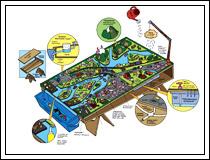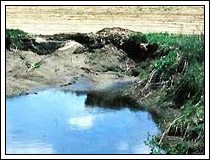Non Point Source Pollution
Non identifiable inputs of waste, such runoff from agricultural areas or wind-borne debris that affect waterbodies like rivers and seas are classified as non-point  source pollution (NPS). Here, discharges occur to a body of water not from a single, defined location like a ship, urban drain, municipal treatment plant, or chemical processing factory, in which case the pollution becomes a point source pollution. In contrast, in non-point source pollution or NPS, there exists multiple sources of pollution. source pollution (NPS). Here, discharges occur to a body of water not from a single, defined location like a ship, urban drain, municipal treatment plant, or chemical processing factory, in which case the pollution becomes a point source pollution. In contrast, in non-point source pollution or NPS, there exists multiple sources of pollution.
The most noteworthy example of non-point source pollution is urban run off, where stormwater washed off of parking lots, roads, highways, and lawns enter a water body, contaminating it with pesticides and fungicides that are contained in the run off. Thus, as the sources of pollution in the case of NPS are diffused and not easily identifiable, it can be quite difficult to regulate or control.
Common Types of Non Point Source Pollution
Mostly, non point source pollution results from surface run offs from fields, especially in rainy seasons. This is a major source of pollution and sometimes the only source too. A few other common types of non-point source pollution are:
Sediment Runoff
This refers to the washed off soils, including silt (fine particles) and suspended solids (larger particles), that enter water bodies and cause high levels of turbidity in them, encouraging the growth of aquatic plants, clog fish gills and smother animal larvae.
Nutrient Runoff
Nitrogen and phosphorus are key pollutants found in nutrient runoff. They enter runoff transported to water bodies from crop residues, irrigation water, wildlife, and atmospheric deposition. But their effects can be efficiently mitigated by implementing proper nutrient management plans.
Pesticides
Pesticides and herbicides used for pest control in various agricultural activities also get washed away from croplands, nurseries, orchards, home gardens, etc., during heavy rains. Entry of pesticides into waterbodies harms the water quality, causing various health as well environmental hazards.

Heavy Metals
Lead, mercury, and zinc are harmful heavy metals, mainly discharged during mining operations, vehicle emissions, urban runoff, industrial operations, etc. These heavy metals are a major type of non point source pollution contaminating waterbodies.
Acids & Salts
Inorganic pollutants like acids and salts are usually dispelled from urban runoffs, industrial sites and cultivated lands. These too are hazardous toxins, whose entry into waterways and drinking water poses severe threats to the entire ecosystem.
|